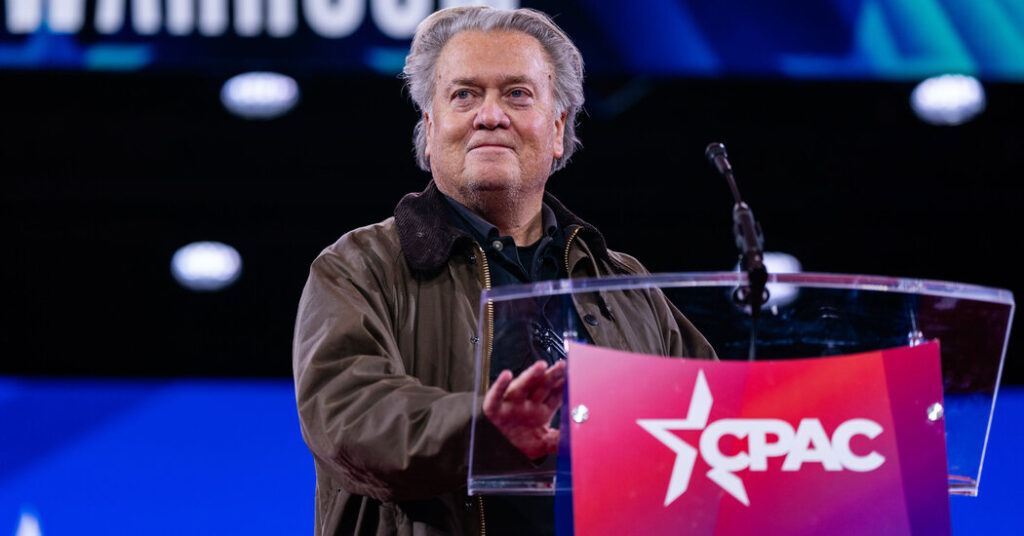A raised-arm salute by Stephen K. Bannon that to many resembled a Nazi one incited an outcry on Friday not just from liberal critics of President Trump and his allies but also from a leader of the European right.
It came a month after Elon Musk made a similar salute, and at a combustible moment when the administration of Mr. Trump, who has long been dogged by charges of encouraging far-right extremism, appears to be leaning more aggressively into far-right alliances around the world.
The gesture late Thursday by Mr. Bannon, a former chief White House strategist and a longtime thought leader in Mr. Trump’s populist movement, immediately drew comparisons to the infamous “Sieg Heil” Nazi salute, as had the one from Mr. Musk, the billionaire leading Mr. Trump’s cost-cutting efforts, on Inauguration Day.
Through Vice President JD Vance, the White House has openly built bridges this month to Alternative for Germany, or AfD, a German right-wing party that has been marginalized for years in that country for its members having reveled in Nazi slogans, but which polls suggest may become the second-largest party in Germany’s parliament in elections on Sunday.
Yet for Jordan Bardella, the president of France’s far-right National Rally, the associations with Mr. Bannon’s gesture, delivered at the Conservative Political Action Conference outside Washington, crossed a line: He announced Friday morning that he had canceled his plans to speak at the conference after “one of the speakers provocatively made a gesture referring to Nazi ideology.”
Mr. Trump and his allies have long drawn outrage for refusing to denounce white nationalists. In 2017, Mr. Trump drew criticism from even prominent Republicans for referring to “very fine people on both sides” of a white nationalist rally in Charlottesville, Va., where a demonstrator killed a counterprotester.
But Mr. Bannon’s and Mr. Musk’s gestures have occurred as Mr. Trump is also extending olive branches to previously marginalized political movements with links to white nationalism in Europe and Africa.
Mr. Bannon, who left Mr. Trump’s first administration after seven months but remains an influential figure on the right through his “War Room” podcast and movement-building efforts, made the gesture near the end of his speech at CPAC.
Suggesting again that President Trump pursue a constitutionally prohibited third term, Mr. Bannon rallied a crowded ballroom with the phrase “Fight, fight, fight,” quoting Mr. Trump’s words after surviving an assassination attempt in Pennsylvania last year. Then, as the crowd cheered and applauded, Mr. Bannon extended his right arm to his side, his palm facing down, in a quick salute.
Mr. Bannon did not address his gesture from the stage. But on Friday, he said in a text message that he had “waved to the MAGA movement as I always do in my motivational speeches.” He assailed Mr. Bardella for pulling out of CPAC, attacking him in vulgar terms, calling him “too weak to govern France” and saying that “the leaders of this worldwide revolution gathered @ CPAC consider him a coward.”
Mr. Bannon’s gesture clearly echoed a similar salute at Mr. Trump’s inauguration rally by Mr. Musk, who has pushed to eliminate agencies that fund aid and development programs abroad, including many that have rankled Europe’s right-wing political parties.
Mr. Musk has vocally supported AfD for months, writing on X that “Only the AfD can save Germany.” He has also for years warned of the threat of a “genocide of white people” in his home country of South Africa based on statements by some far-left politicians there. Mr. Trump nodded to such claims in an executive order he signed this month, halting all U.S. aid to South Africa and prioritizing the resettlement of white “Afrikaner refugees” to the United States.
The gestures come at a time when Mr. Trump and his allies are working to build relationships across an ascendant class of right-wing political movements around the world, a number of which were represented at CPAC.
But Mr. Bardella’s decision highlighted some tensions within that project, particularly in Europe, where even far-right parties have flinched at associations with Nazism. Salutes like those made by Mr. Bannon and Mr. Musk are illegal in Germany, where intelligence agencies have classified — and surveilled — elements of AfD as extremists.
While the Alternative for Germany has reveled in Mr. Musk and Mr. Vance’s support, Mr. Bardella’s National Rally has found associations with Mr. Trump’s allies to be a liability. The party, founded by Jean-Marie Le Pen, spent years trying to remake its image and distance itself from its reputation for racism and antisemitism, a normalization strategy that has paid off in broadened appeal to French voters.
Mr. Bannon’s gesture also quickly became a headache for Giorgia Meloni, Italy’s prime minister, who is scheduled to give a video address at CPAC on Saturday. Like Mr. Bardella and his party, Ms. Meloni, whose career Mr. Bannon had supported, has found political success by moderating many stances of her Brothers of Italy party, which has roots in Italy’s fascist past.
Her opponents have seized on Mr. Bannon’s salute. Elly Schlein, the leader of Italy’s Democratic Party, said Ms. Meloni “should have the decency to disassociate herself from this neo-fascist gathering to serve, for once, the interests of Italy.”
A spokeswoman for Ms. Meloni said she had no plans to cancel her video appearance. And Antonio Giordano, the secretary general of Ms. Meloni’s European Conservatives and Reformists group in the European Parliament, disputed that Mr. Bannon’s gesture was a Nazi salute.
At least one other CPAC speaker appeared to defiantly echo Mr. Bannon’s gesture on Friday. Eduardo Verástegui, a Mexican actor and conservative activist, raised his hand from his heart in a similar salute, holding it raised as some in the crowd applauded. He then pumped his fist and repeated the word “fight.”


